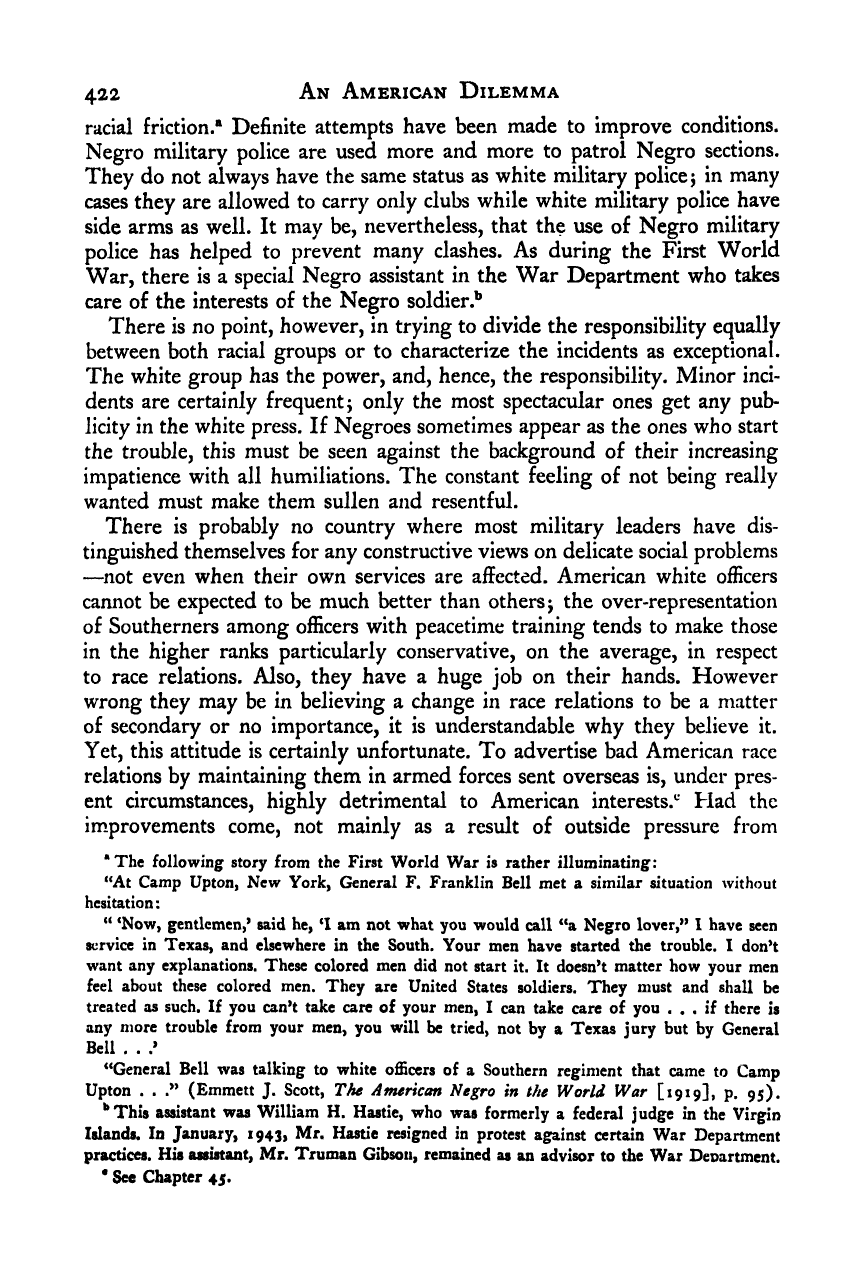Note: Gunnar Myrdal died in 1987, less than 70 years ago. Therefore, this work is protected by copyright, restricting your legal rights to reproduce it. However, you are welcome to view it on screen, as you do now. Read more about copyright.
Full resolution (TIFF) - On this page / på denna sida - IV. Economics - 19. The War Boom—and Thereafter - 4. The Negro in the Armed Forces

<< prev. page << föreg. sida << >> nästa sida >> next page >>
Below is the raw OCR text
from the above scanned image.
Do you see an error? Proofread the page now!
Här nedan syns maskintolkade texten från faksimilbilden ovan.
Ser du något fel? Korrekturläs sidan nu!
This page has never been proofread. / Denna sida har aldrig korrekturlästs.
422 An American Dilemma
racial friction.® Definite attempts have been made to improve conditions.
Negro military police are used more and more to patrol Negro sections.
They do not always have the same status as white military police j
in many
cases they are allowed to carry only clubs while white military police have
side arms as well. It may be, nevertheless, that the use of Negro military
police has helped to prevent many clashes. As during the First World
War, there is a special Negro assistant in the War Department who takes
care of the interests of the Negro soldier.**
There is no point, however, in trying to divide the responsibility equally
between both racial groups or to characterize the incidents as exceptional.
The white group has the power, and, hence, the responsibility. Minor inci-
dents are certainly frequent; only the most spectacular ones get any pub-
licity in the white press. If Negroes sometimes appear as the ones who start
the trouble, this must be seen against the background of their increasing
impatience with all humiliations. The constant feeling of not being really
wanted must make them sullen and resentful.
There is probably no country where most military leaders have dis-
tinguished themselves for any constructive views on delicate social problems
—not even when their own services are affected. American white officers
cannot be expected to be much better than others; the over-representation
of Southerners among officers with peacetime training tends to make those
in the higher ranks particularly conservative, on the average, in respect
to race relations. Also, they have a huge job on their hands. However
wrong they may be in believing a change in race relations to be a matter
of secondary or no importance, it is understandable why they believe it.
Yet, this attitude is certainly unfortunate. To advertise bad American race
relations by maintaining them in armed forces sent overseas is, under pres-
ent circumstances, highly detrimental to American interests.*’ Had the
im.provements come, not mainly as a result of outside pressure from
“The following story from the First World War is rather illuminating:
“At Camp Upton, New York, General F. Franklin Bell met a similar situation without
hesitation
“ ‘Now, gentlemen,’ said he, ‘I am not what you would call “a Negro lover,” I have seen
service in Texas, and elsewhere in the South. Your men have started the trouble. I don’t
want any explanations. These colored men did not start it. It doesn’t matter how your men
feel about these colored men. They are United States soldiers. They must and shall be
treated as such. If you can’t take care of your men, I can take care of you ... if there is
any more trouble from your men, you will be tried, not by a Texas jury but by General
Bell . .
.’
“General Bell was talking to white officers of a Southern regiment that came to Camp
Upton . . .” (Emmett J. Scott, The American Ne^ro in the World War [1919], p. 95).
®This assistant was William H. Hastie, who was formerly a federal judge in the Virgin
Islands. In January, i943> Mr. Hastie resigned in protest against certain War Department
practices. His assistant, Mr. Truman Gibson, remained as an advisor to the War Department.
* See Chapter 45.
<< prev. page << föreg. sida << >> nästa sida >> next page >>